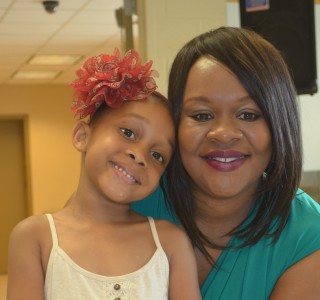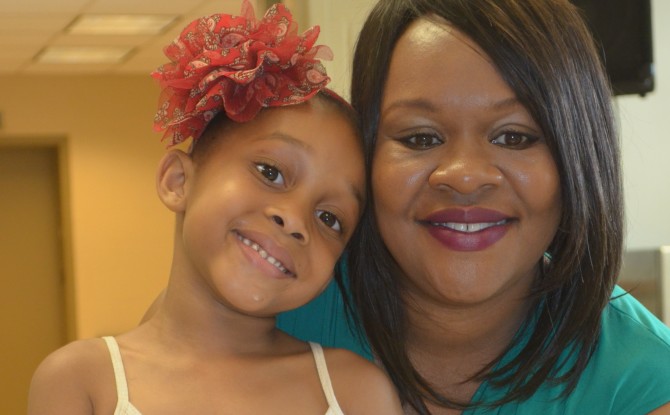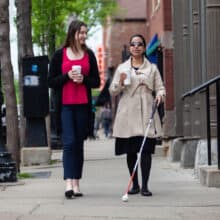
Parenting with A Visual Impairment: More Alike Than Different
May 12, 2016
Last week, I spoke with my mom about her experience raising a child who is blind. Today, I’m looking at the topic of parenting through a different perspective – being a mother with a visual impairment. Dawn Hale works for the Contract Management Services program at The Chicago Lighthouse. She is the proud mother of Madison and Michelle, ages 6 and 8 years old respectively. Dawn has dealt with the effects of Stargardt Disease since childhood, but has always been determined to live a full and independent life. While her visual impairment presents unique challenges, raising her children isn’t any different for her than for other parents.
Like all parents, Dawn wants the best for her children and is very involved with their education and other activities. Staying close to her daughters when out and about in crowded places is especially important, since she can only clearly see things that are within 5 feet.
“My first challenge is allowing [my children] to be kids, and keeping them in my vicinity.”
Dawn recalls the terrifying moment when she lost her youngest daughter Madison while at Chicago’s annual Winter WonderFest. Although security found her within 10 minutes, this was one of the scariest experiences she has ever had. This incident really hit home, and helped the girls understand the importance of staying close to her at all times.
Another particularly difficult challenge for Dawn is not being able to see her daughters partaking in activities. Both girls are enrolled in ballet classes, and – like all children their age – are eager to show off their skills during recitals. Although she is able to see them afterwards thanks to the videos her husband records, it is hard for her knowing she can’t see the live performances.
Simple things like picking Michelle and Madison up from school can also present challenges for Dawn. Given her limited vision and that all of the kids wear uniforms, Dawn cannot spot her children in the crowd.
“It’s so hard to be there at the school every day and not being able to identify your kid.”
Both girls have learned to let mom know they’re there. Dawn thinks that this is in part to their nature as young children, and because she has always been honest to them about her visual impairment. She told both girls early on that “mommy’s eyes don’t work very well,” and that it is very important for them to let her know where they are. She emphasizes that while her daughters occasionally help her with simple things like letting her know when they see the bus coming, Dawn demonstrates her independence and shows that she’s the parent and is not shifting any responsibilities onto them.
Dawn feels she has to be even more involved with her kids because of her visual impairment. Since she can’t see very well, talking with her daughters about their day helps her find out about simple things such as if they got hurt while playing. Like all other parents, Dawn wants the best for her children. Setting her visual impairment aside, her primary role is that of being the best mother she can be.
Dawn encourages all parents with visual impairments to be honest with their children about their vision loss.
“Don’t be fearful to let your kids know what’s going on. They love you, and they have your best intentions in mind.”
Dawn says that being a parent is the hardest job she has ever had. Nevertheless, she is determined to be the best mother possible and will not let her visual impairment get in the way. As she puts it, she will figure it out and cope with the daily challenges – just like all other parents.






